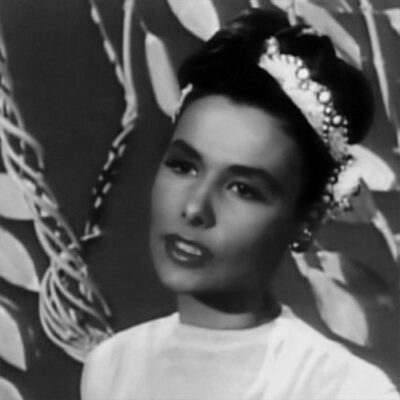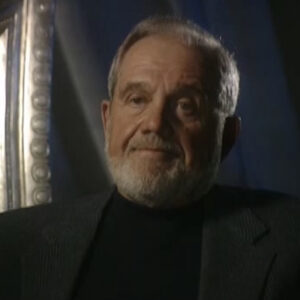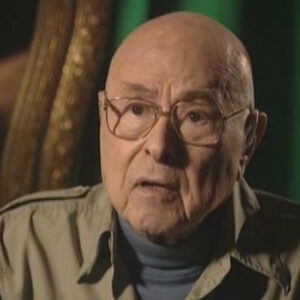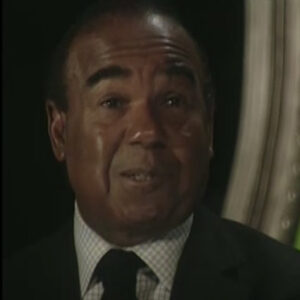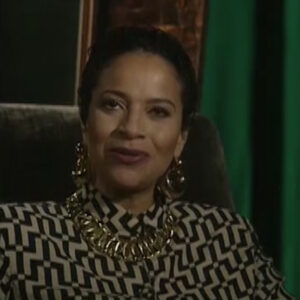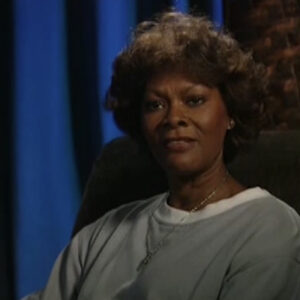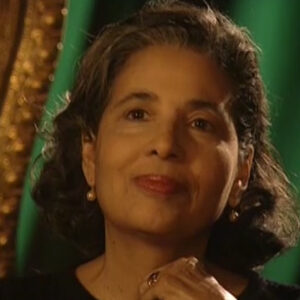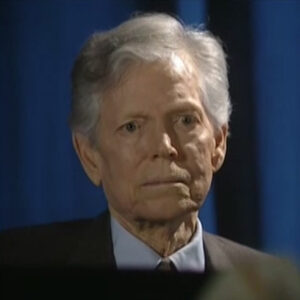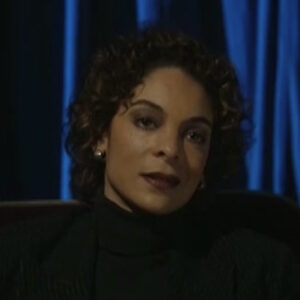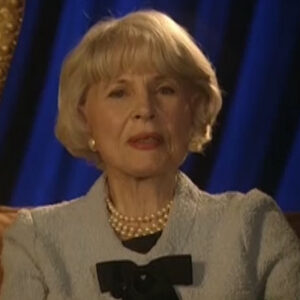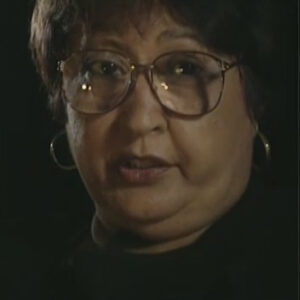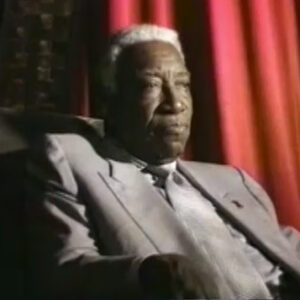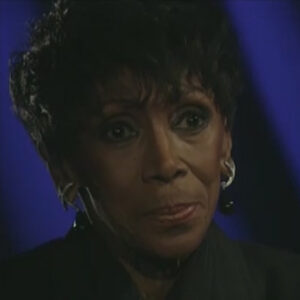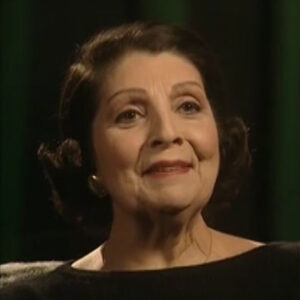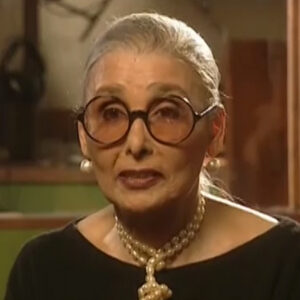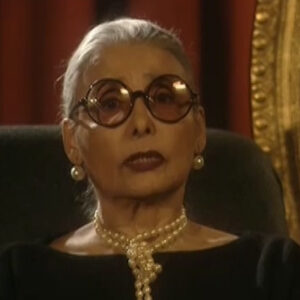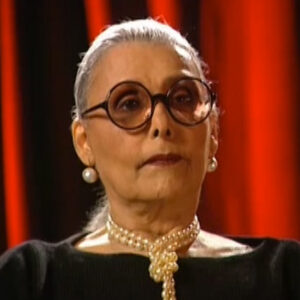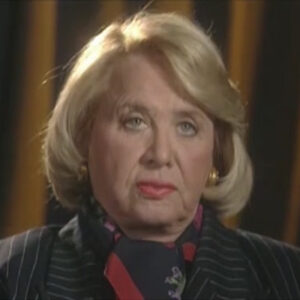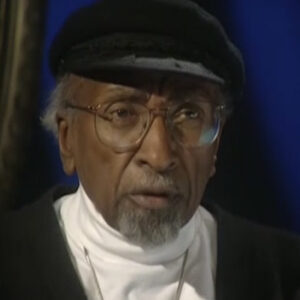Speaker I want you to step back in time for a moment to the time when you first experience and tell me what that was like.
Speaker Well, I had met her and I knew she and Lenny because I used to work at Ciro’s and they came in. So I met her first on a social basis. And of course, I’d seen the films and heard the record. And the first time I think I really saw full performances at the Sands Hotel in Vegas. It was awesome.
Speaker What was so awesome?
Speaker Because it was Lena. I mean, that’s separate from everybody else. And you sat there and she took it to another place. And then, I mean, the colors that she showed you. And it was not just an entertainment, it was an experience. And it still is. The lady is magic. But the first time you saw Lynn, I mean, imagine that it’s just awesome.
Speaker Lina has a very special kind of style that I wonder if you can just describe that for me.
Speaker It’s her style is pure Lina, so she didn’t copy his style or adapt a style, you know, invented a style and it wasn’t invented is the wrong word because it came from her. It came from that life experience. It came from her childhood. It came out of church. It came out of family, came out of work and disappointment and effort and joy. It came from a lot of places. So it was pure Lina. She sings magnificently. But underneath there, she’s telling a story I think maybe that separated her from everybody else because it was a story. And that story came out of her life experiences. And since those experiences were unique, the story was unique.
Speaker And then when you couple that with the voice and the delivery and the way that woman looks, you had something very special.
Speaker Did you have a sense of how much you had to do with her from a distance?
Speaker I mean, I did not I was not involved with them at that point. But when she married Lenny, it was a bit controversial, although it was very quiet and so forth. You know, we didn’t have the tabloids then and so forth.
Speaker But still, it was something quite discussed. And the fact that this got us, you know, was marrying a white man, because when you think about it, that was a long time ago and things have changed a lot. And with the two of them were so proud, you know, and there was joy with them. And he was such a magnificent musician, which is all part of her makeup. And part of her magic is her love of music. And they genuinely loved each other, which was wonderful to see.
Speaker When she was in Vegas, I believe she broke a few barriers a lot. What was Vegas like?
Speaker What was much different? First of all, they were getting Vegas, Vegas, when I first saw it was much different. They were talking about building a high rise hotel. So everything was desert, very flat. And nobody worked Vegas for more than like a week or 10 days. And there were important acts. But Vegas then back then, when I first saw Lane, let’s get back. When I first saw Lena, Vegas had a very strict color barrier. I was working at the Frontier Hotel and the Silver Slipper and black. I couldn’t stay in the hotel. Black folks couldn’t come see the shows and the hotel. And there was a real strong color barrier. And Lena came in and Lena was kind of always separate from other artists because Lena was kind of everybody’s fantasy lady, you know what I mean?
Speaker And so when she came in, there were almost different rules for Lena and for everybody else. But still there was a strict color barrier. Interesting thing about Vegas was black people couldn’t go to the hotels because they couldn’t stay in a hotel.
Speaker They couldn’t come in to see the shows. She can’t imagine today that that exists, but it did. So they built a hotel downtown called the Moulin Rouge, which was just for black people. And suddenly all the white people went down there because they were having more fun than the white people were having on the strip. They went to the Moulin Rouge. Moulin Rouge was hot. So suddenly the hotel owner said, wait a minute, what are we doing here? And since greed takes over all other emotions and motivations, they began to open it up.
Speaker But there was as I said, there was a very strong color barrier and I didn’t see it. But it was quite a famous story that in Vegas one night, Marlene Dietrich was working.
Speaker The Sahara probably was working the Flamingo and Lena was working the Sands and Marlene Dietrich had never been there before. So when she heard about this color thing, she said that’s not acceptable. And so after the second show, the three ladies got together and Milena walked him through the casino and the three ladies, Lena looking magnificent, you know. And of course, Marlene Dietrich was awesome. And Pearl had on a big floppy hat and they walked through the Sahara Hotel and everybody went, it sounds unbelievable today, you know, but everybody went, wow, you walked through the hotel and they went to the Flamingo, which is famous for its connections around. And they walked the Flamingo and then they walked through the Sands Hotel. And I think from that moment on, the color barrier was lowered and then eventually was erased. But it was fascinating.
Speaker I mean, woman changed a lot of things when you did your first show. Mm hmm.
Speaker How did that come about?
Speaker Well, see, I had watched Lena as a fan for a long time, and then I did the Dinah Shore show, and then I got a job to produce the Judy Garland series. And Lena and Judy worked together at MGM and they had gone through a lot of similar experiences, again, because it was much different than the studios actually control the people and they had worked together at MGM, but I don’t think they had ever appeared together. And so one of the first things we did was to pursue Lena and pursue Mickey Rooney and all those people that she’d work with. And so finally, Lena came out, said she’d do the show, and we built a medley of Judy singing Lena songs and Lena singing Judy songs. And two ladies rehearsed. And it was always there was kind of quiet when they rehearsed, they were kind of half singing a little, you know, they were holding back a lot.
Speaker So it was kind of you do this and I’ll do that. And it was very cool. And then we put them in white coats and long white coats and we had a big wall of lights that said Judy. And then on my wall of lights turned and it said, Lena. And we did shows differently than you do them now, because at eight o’clock we did the show and it was top to bottom. What we did was it and those lights came on and here came Judy.
Speaker And now all stops were out and now there was nothing holding back because Judy knew that this was hot and that wall turned around and you saw Lena in lights and Lena came out and the two ladies hit that stage and it went to a level that we hadn’t seen before on television. It was hot. It was it was the whole history of the two women, the things that they suffered together, the joys that they had experienced at MGM.
Speaker And it was one of the it was really an exciting moment in television when the two ladies were there to perform. Boy, did they. It was wonderful. It was a wonderful experience.
Speaker Was it did that make sense or was it too long?
Speaker Did that make any sense? Can you cut that up with shots? I went into more detail than you need, but you can cut that. I’ve gotten away to the boys. You can cut it. OK.
Speaker OK, um, was there a could you describe that?
Speaker Well, it was interesting because nobody really thought Judy was going to be able to do a series because she’d she’d had some problems emotionally and personally and so forth. And I got with Judy and I found it was a very funny lady there and a woman who really wanted to work, but she wanted to have fun. And so much of what we did was to have fun with her and to keep her amused. And she loved to laugh.
Speaker So when we came up with Lina, Judy was not nervous, not not fearful at all. But Judy knew that this what this woman could do to an audience, which was what Judy could do to an audience.
Speaker So the two women had a great deal of respect for each other. So in rehearsal, we would lay out the songs and they would rehearse the songs, but kind of half way. And I remember talking to the director and Mel Tormé was one of the writers on the show. We got him to do the vocal routines. And I said, we’re not even seeing part of what we’re going to see when they hit that stage.
Speaker And it was like it was almost like watching two fighters or watching a Super Bowl game. You know, you saw him holding back. He saw him getting dressed. We would have put it to the music from the Olympics. You know, he went in and Lena was getting dressed and we were all very cool and we’d done a dress rehearsal.
Speaker And then you saw him getting ready, almost like two little race horses. And they both look forward to it. They both were very excited about it. And when they hit that eye, when they hit that stage, the audience went nuts and it just built and built and built. It was a wonderful experience. It’s one of the things that I’m most glad that I was involved in.
Speaker The other thing I forgot to tell you, by the way, one thing was, as we would rehearse, it was much different then and now. Now people come in, they put their music down and play the tracks and they stand up being that’s it. And some, you know, flashlights and strobe lights are going up at parties. But then we rehearsed for a whole week. And so they came in and they rehearsed. They meant that we would have lunch together and so forth.
Speaker And in doing that, they would sit down and talk and talk about the old days and talk about MGM and what what what it had been like under that system. And so it was a whole education for all of us to to be able to sit and listen to the tour, because they were both quite private people in many ways. But then in the dressing room, they would kind of open up. And you heard things I wish I had written down.
Speaker What may surprise you what surprised me about their memories of it was was the fact that they were in many ways controlled. Judy and Mickey Rooney never even had scrapbooks. They would be working on three films at the same time and they would get them up in the morning and give them a little something to get up. And at night they’d give them a little something to go to sleep. And they put them in bed and they never really knew which films they were shooting on. And then Lena, when she came to MGM, she was also somewhat controlled and the studio ran their lives.
Speaker And much of what they talked about sounded painful. But much of what they talked about was also with great pride because they broke through, you know, Lena I mean, Lena broke through so many barriers that had been up, you know, and the Judy told us one night about when she was fired from Annie Get Your Gun.
Speaker And they brought in Betty Hutton.
Speaker And he was this tiny little woman and everybody at MGM was afraid of her and they were going to fire her and she was doing a thing dressed as an Indian Indian. And it was Friday afternoon and they sent her the notice and then they all went to Palm Springs. So here’s this big Thalberg building empty. And Judy says they can’t fire me.
Speaker I’m an Indian. And she went through the whole building trying to find anybody to talk to. And they were all in Palm Springs hiding somewhere because nobody wanted to confront this diminutive little dynamo.
Speaker But they would tell a lot of the stars where to go, who to go with, what to do, what to sing. And and they weren’t totally honest with them. I think they did stuff with Lina about Showboat. You know, that was not would not be allowed today with today’s my lawyers and agents, they would never be allowed to do what they did back then. It wasn’t all pain and it wasn’t all anger at all. There was there was also great joy because the success that both of them had was phenomenal.
Speaker When you when we spoke on the phone, you describe the dynamics between Levi and Julie. You had said that, you know, Julie was about to leave the house sooner or later, wasn’t about to let Julia.
Speaker That’s right.
Speaker Well, they knew it was it was pretty much like two fighters getting ready for the championship match. It wasn’t a competition, but the two women knew that they were out there with the best and each one would get a little better and then the next to the other one would get better.
Speaker So they kept going higher and higher to new, soared to new heights of performance.
Speaker And neither one of them was going to let the other one score any bigger than that.
Speaker And you ought to be able to see that piece because you could see you could see it as you watch the two of them on camera. You could see this. This is more than just a little casual duet. The duet had history to it.
Speaker And I don’t know if we have performers like that. We have Whitney, we have Bette, you know, but they don’t have the history that Julian Assange had. And I think we’re going to have that again.
Speaker Speaking a little bit about one of these answers, much too long.
Speaker Yeah, no, that’s why God invented editing and voiceover and cutaways put a lot in. Yeah, OK. I’m much better voiceover than I am with it.
Speaker Well, we’ve got the material. Good girl.
Speaker Um, speaking a little bit about that history since one of the things that happened with Lena is that she was pretty much frozen out of television during the blacklist time. I wondered if you had any personal experience with the blacklist or could could fill in a little bit of that history for.
Speaker Blacklist. We can’t really understand today what that was about, because you had racial and you had political and nobody ever really knew what anybody did to get on that list or off of it. But my own experience, there was a great deal of stupidity involved. The best example is when we were doing the Dinah Shore Chevy show, Chevrolet was concerned about too many ethnic types. And they’ve gone through the thing with Chrysler, I believe, where Harry Belafonte and Petula Clark touched and they couldn’t air it. And I when I worked at serious good friend of mine was Nat Cole. So and I went to NBC, first thing I did was to try to get Nat King Cole series on the air, which we did. It was a 15 minute series.
Speaker And and it was wonderful and it was not. And it was a real breakthrough show. But the biggest problem was trying to be sure that nobody sat with Nat and nobody I mean, it was it’s it’s we can’t even say it today without feeling very uncomfortable. But Chevrolet was a very conservative sponsor, both politically. And I remember once that I wanted to book Louis Prima and you remember Louis Prima.
Speaker And Louis Prima was an Italian orchestra leader who later worked with Keely Smith in Vegas. And he was great. And the message came back, no, I couldn’t book Louis Prima and I was young and volatile. And I said, what, what, what? It’s never why. They said, we’ve already had too many colored people. And I said, How do you explain to an idiot that, first of all, doesn’t know that Louie’s Italian? Because I guess they had him mixed up with Louis Armstrong. And secondly, that this was going to be a problem. They’re selling cars and we were selling showbusiness. And eventually we were allowed to book Louis Prima. But it did exist then. It existed then in a in a kind of a bad way because it wasn’t spoken once. It was out in the open and people knew there was a blacklist. People knew that black people and white people weren’t supposed to touch black people and white people weren’t supposed to dance. And this was before television and records and movies realized that the culture, our culture, the white culture comes from the black experience of music, our fashion, the language all then and now comes out of the much of it, comes out of the music from the musician’s. Kids are exposed to it. And then they bring it up. And then it’s assumed as part of the white culture and the black code comes into the white experience, which is another show you’ll be one day. But that all came together into a time when there was a political black list and we don’t really know today what they were afraid of when you think about it, because once once that was lowered or lifted or whatever it was, everything got better, music got better, performance got better and relationships got better. But Lena was out in front of all of that. She llena experienced a lot of that, I don’t think even Lena realizes, however, if she was separate from much of it because there was Lena and then there was everybody else, I’m sure she experienced a lot of it, but she was always very special and separate from much of it. Frank Sinatra wouldn’t stay when he was on tour with Harry James and Dorsey. He wouldn’t stay in a hotel that wouldn’t let the whole band stay in the hotel. And so there were a lot of influences that took place that lowered that barrier.
Speaker Do you think one of the things that Lena has said in terms of how she the image that she had back then was that she was trying her best to not be any one stereotype of a black. What do you feel that that is part of part?
Speaker She was trying not to be what?
Speaker The stereotypical what she thought.
Speaker Well, nothing about Lina was ever stereotypical, but in many ways, I think Lena Horne is maybe the essence of what is the very best about all women in general and particularly black women. She has class and pride and elegance.
Speaker And yet if you want to go for it, you get down with you and she can handle itself. You know what I mean? I mean, don’t mess with Lena and but she’s an elegant, wonderful, immaculate, classy lady, you know, that speaks the king’s English. But if you mess with her, you won’t get funky. Yeah, she can take care of you and your youth and you want to mess with her. She can take care of you and your friends.
Speaker So maybe that’s the best of of what the black culture has to offer in many ways.
Speaker Well, you were I don’t know whether that’s going to make sense unless you get into a more detailed explanation. That’s because she hurt her.
Speaker She could deal on any level she could go and Lena could deal on any level.
Speaker She could go into the boardroom at MGM and deal on a level and then she could get down to the Bases nightclub. Right. And stay up till 3:00 o’clock singing anything and and and relating to the sisters, you know. And so there were Lena was on many levels.
Speaker And so there’s nothing about Lena stereotypical at all. We only have one. Right. We only had one.
Speaker Lena Horne described to me what you had to go through to actually get Lena to do that. Hmm.
Speaker Tell me about Lena.
Speaker First of all, when I signed to do the Judy Garland Show, I wanted Lena. That was, I think, the first booking we went after because I thought and eventually I was right that working with Lena would bring out of Judy what we hadn’t seen because Judy in movies worked with people. But we hadn’t really seen the Judy that the television camera would bring. And I thought because of the relationship that Lena and Judy would be perfect together. So that’s the first booking we went after. Lena, I think, may have been a little hesitant. First of all, she didn’t do television that much and she was in New York and she didn’t really know me.
Speaker We’d met and so forth, but she didn’t really know what the approach would be or how it would be handled or would she be with Judy B here and Lena treated here.
Speaker And and so I explained to her and as well as I could that I thought it would be she would be handled equally and in a very exciting way.
Speaker And luckily for us and for Judy and for history, Lena trusted me and came out and did what I still think is one of the best duets ever done.
Speaker We all seen that show, wasn’t it, wasn’t it?
Speaker I mean, but you knew you were looking at more than a duet when you watch that show, you knew you were looking at more than a duet. You were looking at a relationship, a friendship, a competition.
Speaker You were looking at two ladies who were the best doing what they did as well, if not maybe a little bit better than they’d done it before because they were together out there.
Speaker Can I get the next layer of that same answer when, you know, you told me that, you know, I wasn’t crazy about flying.
Speaker Oh. Oh, well. And you basically had to grovel.
Speaker Well, yeah. I mean, I think maybe the best word would be grovel. Lina did not like to fly, still doesn’t like to fly. She was in New York and not crazy about the coast and not crazy about coming out here, not crazy about doing television and and also a little bit a little bit skeptical, a little bit guarded about how she was going to be handled and how what she was going to do. So no phone calls, a lot of letters, some flowers, a lot of groveling.
Speaker And then eventually she said, well, I guess maybe she got tired of ducking me and said, well, all right. I said, lady, you just got to trust me. And I’m glad she did.
Speaker But you still have to. I mean, Laina still has a little hesitancy. Once she’s in once she jumps in the pool man, she swims like crazy.
Speaker But getting her to decide to do it is always a little guarded. And I think that maybe went back to the old MGM Days when everybody told her what to do and told her, don’t do this, do that, you know, and you just never had a lot of luck telling Mizulina what to do. You were best if you explained what you wanted clearly. And then if she wanted to do it, she would. But once she got there, look out. Lady came to work.
Speaker There was no how did how did I get involved in that?
Speaker Well, Lena and Frank also went way back and Lena knew Frank out at MGM and Lena was very friendly with Eva. So Lena was involved in the whole legend of Mr. Sinatra, too. And they were friends.
Speaker And I have enormous respect for each other.
Speaker Which is understandable, the. So whose idea was it to get Frank and say that, you know, when they started doing the duet album, Frank said, let’s see if we can get Lena.
Speaker It was one of the first.
Speaker That was basically I think that was one of the basic ideas of the album, was to try to get Lena to do it, do it because they knew each other and they respected each other and they really liked each other. And as I say, Lena was lean and Frank. We’re all together in those early years with Lena, Frank, Judy and, uh, and Lena Nueva.
Speaker Did at any point, do they actually work together? No, they don’t.
Speaker It was done separately. Yeah, it was Linda’s schedule, Frank’s schedule. It just was impossible to get them together.
Speaker What was it like working for you in the studio with me? No, no, no, no.
Speaker I’m the other guy. Yeah, but a huge task, you don’t you, to try to take this bigger than life person and put her in a one hour box and try to see all the shapes and colors and tones.
Speaker I hope you do it well. It is, yeah, um, do you remember the song that they did together, I get it for you.
Speaker I’m not sure if you had something to say about it. No, no, no. I know we wanted to do this.
Speaker And first of all, you know, to get it, to do the duet and then to do it on camera. And she said, OK. And she showed up to sing to do it and do the interview.
Speaker And she had like a black shawl over her hair and she had no makeup. And she sat and, you know, kind of a cameo look and sang and talked. And it was like just warm, honey. I mean, she looked gorgeous and just so simple and so, uh, simple elegance was wonderful.
Speaker And you.
Speaker Yeah, OK, I’ve got to figure out whether or not I can get that cleared for you, because that’s.
Speaker I also want to ask you, I’m just stress where I can get the full picture to talk about you for a minute in terms of what were you doing in Vegas, what what you knew when you were there?
Speaker What were you doing?
Speaker I used to manage Ciro’s on the Sunset Strip. That’s where I first met Lena and at the same time I was booking the shows at the Frontier Hotel and at the Silver Slipper in Vegas. And I was doing both things. And then I went to get married and my wife, Jillian, said she would marry me if I got out of saloons and got out of Vegas.
Speaker So I said, if you got it. So then I stopped going back to Vegas and became moderately respectable and you became really respectable.
Speaker First of all, I went into television to book the Dinah Shore show because I knew all of the nightclub acts that all worked zero zero Vegas. And I was close with Martin and Lewis and Sammy Davis knew Lena and. Oh, God, people you don’t even remember now, Sophie Tucker and probably and Louis Armstrong and all of those people who worked nightclubs. So I went to NBC to to book guest stars. And then eventually I became the producer of the Dinah Shore TV show. And then I left that to go to CBS and do the Judy Garland. So we did six shows that were mind blowing that were great. It was Mickey Rooney and we did one with lies and we did one on one with Baozi. And Tony Bennett, they were great. And then CBS said we wanted to change the show because they wanted Judy to be more the girl next door.
Speaker They got to understand this is the early 60s, you know, so I was fairly arrogant and quite cocky.
Speaker And I said only one guy lives next door to anybody like that, and that’s her neighbor. I said, Judy, especially since it was too exciting, too much too intense. And I said it was too much like specials. And they wanted you to be the girl next door. And I said, then you got to move in next door to her. And I said, I didn’t buy her for a weekly show, but I’ll deliver a weekly show. I said, she is special. And so the show I’m going to do is a special every week. And they said, no, you’re not.
Speaker And so it was one of, well, the most abrupt dismissals in the history of television.
Speaker And then they ran those six shows throughout the season, kind of a special events, and then they made it the girl next door and lasted one season. But Judy was very special. They came out of a special time, Judy and Mickey, Lena and all of those people.
Speaker And I’m not too sure that we have the climate or the atmosphere to to grow anymore of those. They were total performers. They could sing and dance and act, and they could work in front of a band. They could work in front of a camera. They were performers who had experienced the entire spectrum of show business. And out of that came Sammy and those people who were, as I say, total performers. We don’t have that anymore. When Lena went out to appear, Lena did the show top to bottom, no retakes, no inserts, no pickups, no multiple cameras, no ISO’s, the same as Judy. And when Frank when Frank made his records, he would go in and sing top to bottom. They don’t understand about doing for buyers here, doing a pick up of a word there. They arrived to perform. And that was the thing about Lena. There was no take two. It was no. I mean, she arrived, she was dressed, she was ready emotionally and physically. And she went out there and she took no prisoners, was a different kind of performer. Then they didn’t have panic spots and strobe lights and smoke and wind machines.
Speaker They went out with themselves and a microphone and and did their magic was much more simple, much more pure. And in many ways, I like what we’re doing today, but I sure do miss kind of that kind of show business that we used to have.
Speaker Did you do any other shows with her?
Speaker Yeah, I did some Grammy shows did Steve last year we would be you know, you’re not the one I remember the most vividly was the Judy Garland Show, because I don’t think of all the shows I’ve done.
Speaker I think I don’t think I ever did much better than that if I ever did as well as that. But I think they’ll agree.
Speaker I mean, I think Judy would tell you that was one of her favorite shows because it was that show was more than just a show. That was a relationship. It told us it was history and that it told the relationship of the two women and it told it told a lot of things without saying a word. You just were aware that you were not looking at just a duet.
Speaker We were looking at two people in that time that you work with. Did you ever.
Speaker Oh, no, Lina is a perfectionist, and I think I knew that, and I think that when Lina arrived, we were ready for Lina, the same as when you worked with Lina or Frank Sinatra or any of those people.
Speaker They arrive ready to go and you better be ready to go. The orchestra’s ready. The sound is ready. The lights are ready. You don’t call them in to rehearse cameras. You don’t call them in to rehearse audio people. You do that before they get there. And if you do it that way and if it’s thawed out and if you were honest with her, totally, absolutely honest with her, then you didn’t experience her anger. But Lina could sense a calm coming from way down the street.
Speaker So you just didn’t calm that lady. And if you didn’t if you did what you’re supposed to do, then she did what she was supposed to do and you didn’t see any anger. I heard about anger, but you couldn’t calm that woman that would that would get her upset. And you better know what you’re doing then. It was a wonderful experience. I do understand that sometimes it didn’t go that smoothly. It did with me. I had a ball with the lady.
Speaker Was smart enough to do it right?
Speaker Well, I don’t think it was intelligence as much as it was respect for one of our treasures, you know, because we don’t have that many.
Speaker And she is very special. And she is a treasure.
Speaker She is a product of a social, economic and political and entertainment climate that produced a very unique woman. Plus the genes and whatever went into this magnificent look, you know, and that awesome attitude.
Speaker And then the fabulous voice.
Speaker When Nina was performing in Vegas, who were the other I mean, what was how would you. Classify the pantheon of who, who or the, uh, who were the biggest performers then?
Speaker Lina, strangely enough, while there was a strict color barrier in Vegas, many of the biggest performers were Lena and Harry Belafonte and probably and Nat Cole and, you know, Louis Armstrong, they were hugely popular in Vegas.
Speaker But then it was the same time you had Dean and Jerry and Frank. And as I say, motion picture stars went up to Vegas. Then I did a show once.
Speaker The Frontier Hotel with Ronald Reagan wasn’t real good with it. He was all right. He was charming even then. He was really charming. But I have a picture in the office of Ronald Reagan with the vocal quartet doing part of that act dressed as a waiter. But and there were comics up there and Jerry Lewis and the Fat Jack Leonard and Durante was big at that time.
Speaker And Sophie Tucker and Mae West were probably we booked Maurice Chevalier. Noel Coward worked Vegas once.
Speaker It’s like that, and it was exciting town with two shows during the week, three shows weekends, Chuckwagon was a dollar. Every hotel had a chorus line chorus line after the last show had to come out and mix and just sit out in the casino and make a whole lot of things that we’ve done then are politically incorrect now. But it was an exciting time. Of course, Frank was magic. He would ignite the hold up. There were some performers then that just ignited the whole town. All of them were working one hotel. The whole town came to life.
Speaker And I think probably Sinatra was the real event. The biggest event in Vegas was when Frank would come. But then along with that, there was Lena and the rest of the people that I mentioned. And we don’t see anything like that today for the big club.
Speaker What was the point?
Speaker Well, they were building hotels like crazy, the first hotels with the El Rancho and the bingo, which became the Sahara and the frontier was there early and then the flamingo, which Mr. Siegel built. And then then it was very exciting because the new trendy Hyatt Hotel became the sands. And that was the whole group from the Copa came out with Martin and Lewis and Sinatra. Lena and the Sands was the hot hotel for a long time. And then they built the Tropicana and then they kept building, building, building. But but it was more of a community event. Hank Henry was at the Silver Slipper with a burlesque show.
Speaker And then down the street, Don Rickles and Louis Prima were in the lounges. So there was a show that would go on two o’clock in the morning. So nobody ever slept in Vegas when you saw Louis Prima, Don Rickles at the Sahara Lounge. And that was show business and everybody would come from all the other hotels down to see Rickles.
Speaker There was a different time. It was a different I don’t think we’ll ever have that again, but it was exciting. And then you try to get in to see Miss Horne. She was great. She still is great.
Speaker You know, I mean, the lady the lady could walk out on the stage today and the audience would stand up just on her entrance and she could sit quietly at a piano and hold an audience for as long as she wanted to do it.
Speaker Let me ask you this, what you thought. Mm hmm. What was your response to that?
Speaker Knew this was a mature leana when when you saw the lady and her music. It was a mature Allena. She was not in her 20s or in her 30s. It was not the absolute perfect vocal production that she had once had. But there was another quality that was there.
Speaker She’s a grandmother now, you know, to imagine the fantasy lady of millions of people, that she’s a grandma and she’s proud of it. So there was another texture to Lena. There were more levels playing, but.
Speaker The magic was still there, so you can’t take that away from you can put one woman when the woman is 108, the woman is going to be magic because whatever divine power you believe and touched that human being in a very special way and she in turn touched us.
Speaker Schoeman Sneyd told me that, uh, after you’ve seen it, you told him. I never saw that one before.
Speaker Well, Lenno has gone through many stages, and when you saw that show, that was a different line and that was a mature woman. That was a woman who had experienced all of this and had grand, you know, it was a grandma. And so you were looking at another intellectually different woman and creatively different woman because she was singing with a new kind of awareness of the life that she had had before. I don’t. There was always a little anger underneath Lena, and that could be either an anger, maybe the wrong word, maybe it was intensity, maybe it was passion.
Speaker But there was always more than just lyrics and melody with Lena. There was something underneath there. And you were aware of the fact that behind her music, there was history and there were secrets and there was more than just notes and music. So when you saw her in that show, you had a different experience because it was it was a different woman, you know, basically the same, but with new things.
Speaker So it wasn’t my appreciation of that show was that there was always there was always something new going on. And there was then, too. I mean, I wish she’d gone to a concert today and what she’d fill the place and she could stay on stage as long as she wanted.
Speaker Now she may feel vocally she couldn’t do all of the things that she used to do.
Speaker And so she might be hesitant and say, well, I can’t do what I used to do. No, Lena, but you can do what you do now better than anybody’s ever done it. So go for it. You know, she’s a very special lady and she means a great deal to me. She means to everybody everybody has a memories of Lena where they heard it. Lena and Frank are very similar in many ways because you remember where you heard Lena.
Speaker You remember you know, I mean, we tease Frank about the fact that he probably was responsible for the conception more of his audience than anyone in history. But they’re up there along with each other. Lena is very special and means a great deal to a lot of us. Be nice to the lady, you know. But how are you going to put that woman into an hour? I don’t know how you do that. She’s an at least a week and I don’t know how you do it in an hour. It’s too much story. And you’ve got to hear her sing. You’ve got to hear it talk. Good luck. I’m waiting. By the way, when you finish this, I’m waiting for part two, part three and part four. And until then, I get busy on part five.

